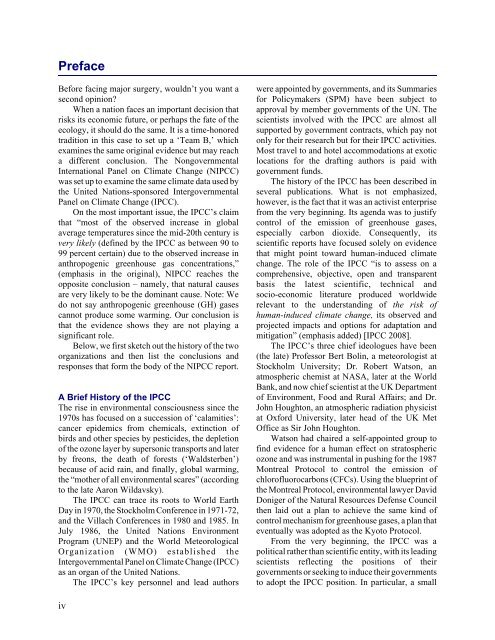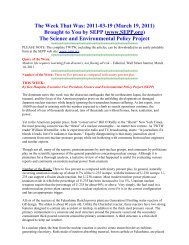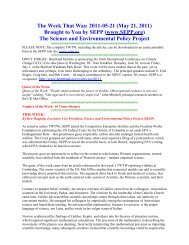PrefaceBefore facing major surgery, wouldn’t you want asecond opinion?When a nation faces an important decision thatrisks its economic future, or perhaps <strong>the</strong> fate of <strong>the</strong>ecology, it should do <strong>the</strong> same. It is a time-honoredtradition in this case to set up a ‘Team B,’ whichexamines <strong>the</strong> same original evidence but may reacha different conclusion. The NongovernmentalInternational Panel on <strong>Climate</strong> Change (NIPCC)was set up to examine <strong>the</strong> same climate data used by<strong>the</strong> United Nations-sponsored IntergovernmentalPanel on <strong>Climate</strong> Change (IPCC).On <strong>the</strong> most important issue, <strong>the</strong> IPCC’s claimthat “most of <strong>the</strong> observed increase in globalaverage temperatures since <strong>the</strong> mid-20th century isvery likely (defined by <strong>the</strong> IPCC as between 90 to99 percent certain) due to <strong>the</strong> observed increase inanthropogenic greenhouse gas concentrations,”(emphasis in <strong>the</strong> original), NIPCC reaches <strong>the</strong>opposite conclusion – namely, that natural causesare very likely to be <strong>the</strong> dominant cause. <strong>Not</strong>e: Wedo not say anthropogenic greenhouse (GH) gasescannot produce some warming. Our conclusion isthat <strong>the</strong> evidence shows <strong>the</strong>y are not playing asignificant role.Below, we first sketch out <strong>the</strong> history of <strong>the</strong> twoorganizations and <strong>the</strong>n list <strong>the</strong> conclusions andresponses that form <strong>the</strong> body of <strong>the</strong> NIPCC report.A Brief History of <strong>the</strong> IPCCThe rise in environmental consciousness since <strong>the</strong>1970s has focused on a succession of ‘calamities’:cancer epidemics from chemicals, extinction ofbirds and o<strong>the</strong>r species by pesticides, <strong>the</strong> depletionof <strong>the</strong> ozone layer by supersonic transports and laterby freons, <strong>the</strong> death of forests (‘Waldsterben’)because of acid rain, and finally, global warming,<strong>the</strong> “mo<strong>the</strong>r of all environmental scares” (accordingto <strong>the</strong> late Aaron Wildavsky).The IPCC can trace its roots to World EarthDay in 1970, <strong>the</strong> Stockholm Conference in 1971-72,and <strong>the</strong> Villach Conferences in 1980 and 1985. InJuly 1986, <strong>the</strong> United Nations EnvironmentProgram (UNEP) and <strong>the</strong> World MeteorologicalOrganization (WMO) established <strong>the</strong>Intergovernmental Panel on <strong>Climate</strong> Change (IPCC)as an organ of <strong>the</strong> United Nations.The IPCC’s key personnel and lead authorswere appointed by governments, and its Summariesfor Policymakers (SPM) have been subject toapproval by member governments of <strong>the</strong> UN. Thescientists involved with <strong>the</strong> IPCC are almost allsupported by government contracts, which pay notonly for <strong>the</strong>ir research but for <strong>the</strong>ir IPCC activities.Most travel to and hotel accommodations at exoticlocations for <strong>the</strong> drafting authors is paid withgovernment funds.The history of <strong>the</strong> IPCC has been described inseveral publications. What is not emphasized,however, is <strong>the</strong> fact that it was an activist enterprisefrom <strong>the</strong> very beginning. Its agenda was to justifycontrol of <strong>the</strong> emission of greenhouse gases,especially carbon dioxide. Consequently, itsscientific reports have focused solely on evidencethat might point toward human-induced climatechange. The role of <strong>the</strong> IPCC “is to assess on acomprehensive, objective, open and transparentbasis <strong>the</strong> latest scientific, technical andsocio-economic literature produced worldwiderelevant to <strong>the</strong> understanding of <strong>the</strong> risk ofhuman-induced climate change, its observed andprojected impacts and options for adaptation andmitigation” (emphasis added) [IPCC 2008].The IPCC’s three chief ideologues have been(<strong>the</strong> late) Professor Bert Bolin, a meteorologist atStockholm University; Dr. Robert Watson, anatmospheric chemist at NASA, later at <strong>the</strong> WorldBank, and now chief scientist at <strong>the</strong> UK Departmentof Environment, Food and Rural Affairs; and Dr.John Houghton, an atmospheric radiation physicistat Oxford University, later head of <strong>the</strong> UK MetOffice as Sir John Houghton.Watson had chaired a self-appointed group tofind evidence for a human effect on stratosphericozone and was instrumental in pushing for <strong>the</strong> 1987Montreal Protocol to control <strong>the</strong> emission ofchlorofluorocarbons (CFCs). Using <strong>the</strong> blueprint of<strong>the</strong> Montreal Protocol, environmental lawyer DavidDoniger of <strong>the</strong> Natural Resources Defense Council<strong>the</strong>n laid out a plan to achieve <strong>the</strong> same kind ofcontrol mechanism for greenhouse gases, a plan thateventually was adopted as <strong>the</strong> Kyoto Protocol.From <strong>the</strong> very beginning, <strong>the</strong> IPCC was apolitical ra<strong>the</strong>r than scientific entity, with its leadingscientists reflecting <strong>the</strong> positions of <strong>the</strong>irgovernments or seeking to induce <strong>the</strong>ir governmentsto adopt <strong>the</strong> IPCC position. In particular, a smalliv
group of activists wrote <strong>the</strong> all-important Summaryfor Policymakers (SPM) for each of <strong>the</strong> four IPCCreports [McKitrick et al. 2007].While we are often told about <strong>the</strong> thousands ofscientists on whose work <strong>the</strong> Assessment reports arebased, <strong>the</strong> vast majority of <strong>the</strong>se scientists have nodirect influence on <strong>the</strong> conclusions expressed by <strong>the</strong>IPCC. Those are produced by an inner core ofscientists, and <strong>the</strong> SPMs are revised and agreed to,line-by-line, by representatives of membergovernments. This obviously is not how realscientific research is reviewed and published.These SPMs turn out, in all cases, to be highlyselective summaries of <strong>the</strong> voluminous sciencereports – typically 800 or more pages, with noindexes (except, finally, <strong>the</strong> Fourth AssessmentReport released in 2007), and essentially unreadableexcept by dedicated scientists.The IPCC’s First Assessment Report [IPCC-FAR 1990] concluded that <strong>the</strong> observed temperaturechanges were “broadly consistent” with greenhousemodels. Without much analysis, it arrived at a“climate sensitivity” of a 1.5º to 4.5º C temperaturerise for a doubling of greenhouse gases. TheIPCC-FAR led to <strong>the</strong> adoption of <strong>the</strong> Global<strong>Climate</strong> Treaty at <strong>the</strong> 1992 Earth Summit in Rio deJaneiro.The FAR drew a critical response [SEPP 1992].FAR and <strong>the</strong> IPCC’s style of work also werecriticized in two editorials in <strong>Nature</strong> [Anonymous1994, Maddox 1991].The IPCC’s Second Assessment Report [IPCC-SAR 1996] was completed in 1995 and published in1996. Its SPM contained <strong>the</strong> memorable conclusion,“<strong>the</strong> balance of evidence suggests a discerniblehuman influence on global climate.” The SAR wasagain heavily criticized, this time for havingundergone significant changes in <strong>the</strong> body of <strong>the</strong>report to make it ‘conform’ to <strong>the</strong> SPM – after itwas finally approved by <strong>the</strong> scientists involved inwriting <strong>the</strong> report. <strong>Not</strong> only was <strong>the</strong> report altered,but a key graph was also doctored to suggest ahuman influence. The evidence presented to support<strong>the</strong> SPM conclusion turned out to be completelyspurious.There is voluminous material available about<strong>the</strong>se text changes, including a Wall Street Journaleditorial article by Dr. Frederick Seitz [Seitz 1996].This led to heated discussions between supporters of<strong>the</strong> IPCC and those who were aware of <strong>the</strong> alteredtext and graph, including an exchange of letters in<strong>the</strong> Bulletin of <strong>the</strong> American Meteorological Society[Singer et al. 1997].SAR also provoked <strong>the</strong> 1996 publication of <strong>the</strong>Leipzig Declaration by SEPP, which was signed bysome 100 climate scientists. A booklet titled “TheScientific Case Against <strong>the</strong> Global <strong>Climate</strong> Treaty”followed in September 1997 and was translated intoseveral languages. [SEPP 1997. All <strong>the</strong>se areavailable online at www.sepp.org.]In spite of its obvious shortcomings, <strong>the</strong> IPCCreport provided <strong>the</strong> underpinning for <strong>the</strong> KyotoProtocol, which was adopted in December 1997.The background is described in detail in <strong>the</strong> booklet“<strong>Climate</strong> Policy – From Rio to Kyoto,” publishedby <strong>the</strong> Hoover Institution [Singer 2000]. The KyotoProtocol also provoked <strong>the</strong> adoption of a shortstatement expressing doubt about its scientificfoundation by <strong>the</strong> Oregon Institute for <strong>Science</strong> andMedicine, which attracted more than 19,000signatures from scientists, mainly in <strong>the</strong> U.S. [Thestatement is still attracting signatures, and can beviewed at www.oism.org.]The Third Assessment Report of <strong>the</strong> IPCC[IPCC-TAR 2001] was noteworthy for its use ofspurious scientific papers to back up its SPM claimof “new and stronger evidence” of anthropogenicglobal warming. One of <strong>the</strong>se was <strong>the</strong> so called‘hockey-stick’ paper, an analysis of proxy data,which claimed <strong>the</strong> twentieth century was <strong>the</strong>warmest in <strong>the</strong> past 1,000 years. The paper was laterfound to contain basic errors in its statisticalanalysis. The IPCC also supported a paper thatclaimed pre-1940 warming was of human origin andcaused by greenhouse gases. This work, too,contained fundamental errors in its statisticalanalysis. The SEPP response to TAR was a 2002booklet, “The Kyoto Protocol is <strong>Not</strong> Backed by<strong>Science</strong>” [SEPP 2002].The Fourth Assessment Report of <strong>the</strong> IPCC[IPCC-AR4 2007] was published in 2007; <strong>the</strong> SPMof Working Group I was released in February; and<strong>the</strong> full report from this Working Group wasreleased in May – after it had been changed, onceagain, to ‘conform’ to <strong>the</strong> Summary. It is significantthat AR4 no longer makes use of <strong>the</strong> hockey-stickpaper or <strong>the</strong> paper claiming pre-1940 human-causedwarming.AR4 concluded that “most of <strong>the</strong> observedincrease in global average temperatures since <strong>the</strong>mid-20th century is very likely due to <strong>the</strong> observedincrease in anthropogenic greenhouse gasv
- Page 1 and 2: Nature, Not Human Activity,Rules th
- Page 3: ForewordIn his speech at the United
- Page 7: that action must be taken to reduce
- Page 11: Nature, Not Human Activity, Rules t
- Page 15 and 16: Global and U.S. Mean Surface Temper
- Page 19 and 20: verification of the IPCC’s analys
- Page 21 and 22: ! Global warming prior to 1940 was
- Page 23 and 24: Lockwood and Fröhlich [2007] have
- Page 25 and 26: Figure 16: A result from the U.S. N
- Page 27 and 28: Sea Level Since Last Glacial Maximu
- Page 29 and 30: It is likely that actual SL observa
- Page 31 and 32: Figure 21: CO 2 levels versus latit
- Page 33 and 34: lamed on global warming. The author
- Page 35 and 36: ates were linearly related to avera
- Page 37 and 38: Estimated Annual Impact on U.S. ofD
- Page 39 and 40: About the ContributorsAnderson, War
- Page 41 and 42: ReferencesAnonymous 1994. IPCC’s
- Page 43 and 44: Keatinge W.R. et al, 2000. Heat rel
- Page 45 and 46: Rahmstorf, S., et al. 2007. Recent
- Page 47 and 48: AcronymsAGW Anthropogenic Global Wa
- Page 49 and 50: Labohm, Hans, Simon Rozendaal, and





